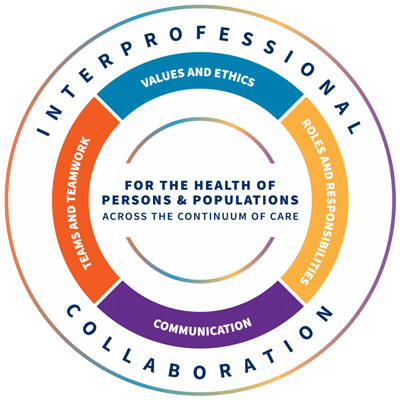Interprofessional Education (IPE) Academy
The Dakota Geriatric Workforce Enhancement Program (GWEP) assures interdisciplinary partnering by design. The national and regional advisory councils are composed of interdisciplinary experts in Geriatrics and Alzheimer's disease and related dementias. The University of North Dakota School of Medicine & Health Sciences (UND SMHS) is at the forefront of IPE having designed its new building around four geographic IPE centers. For more information, see the UND SMHS Office of Interprofessional Education. It uses TeamSTEPPS curriculum from the Agency for Healthcare Research and Quality to foster interprofessional competencies. The Dakota GWEP codifies interdisciplinary partnering and education by creating the Dakota IPE Teaching Academy. This academy supports "train the trainer" through an interprofessional lens and team-based care. Steeped in learning sciences, the academy supports instructional design, assessment, technology and delivery. These services will be augmented with the UND Teaching Transformation & Development Academy which supports faculty learning communities.
Four Interprofessional Education Competencies

There are four core IPE competencies and sub-competencies for best practices. The following desired principles are: patient and family centered (hereafter termed "patient centered"); community and population oriented; relationship focused; process oriented; linked to learning activities, educational strategies, and behavioral assessments that are developmentally appropriate for the learner; able to be integrated across the learning continuum; sensitive to the systems context and applicable across practice settings; applicable across professions; stated in language common and meaningful across the professions; and outcome driven. For more information, view IPEC Core Competencies for Interprofessional Collaborative Practice.
Competency 1
Work with individuals of other professions to maintain a climate of mutual respect and shared values.
(Values/Ethics for Interprofessional Practice)
Key Principles: Patient-centered, Relationship-focused, Outcome-driven
Competency 2
Use the knowledge of one's own role and those of other professions to appropriately assess and address
the healthcare needs of patients and to promote and advance the health of populations.
(Roles/Responsibilities)
Key Principles: Patient-centered, Community and Population-oriented, Outcome-driven
Competency 3
Communicate with patients, families, communities, and professionals in health and other fields in a
responsive and responsible manner that supports a team approach to the promotion and maintenance of
health and the prevention and treatment of disease. (Interprofessional Communication)
Key Principles: Patient-centered, Relationship-focused, Process-oriented,
Outcome-driven
Competency 4
Apply relationship-building values and the principles of team dynamics to perform effectively in
different team roles to plan, deliver, and evaluate patient/population-centered care and population
health programs and policies that are safe, timely, efficient, effective, and equitable. (Teams and
Teamwork)
Key Principles: Patient-centered, Relationship-focused, Process-oriented, Community and
Population-oriented, Outcome-driven
Resources
The Dakota GWEP IPE Academy extends to other state, community, and tribal colleges engaged in training health professionals. The inclusion of North Dakota State University Pharmacy and South Dakota State University Nursing is involved in our work to strengthen interdisciplinary partnerships in our region. All these educational offerings are developed with interprofessional faculty in medicine, nursing, pharmacy, and allied health professions. Here are some healthcare IPE-related resources that healthcare faculty can use to teach IPE:
-
American Interprofessional Health Collaborative
Provides IPE-related news, resources, and information on conferences and events. -
Center for Medical Simulation
Offers simulation-based IPE training programs and resources. -
Interprofessional Education and Practice
Guide No. 1; Developing Faculty to Effectively Facilitate Interprofessional Education
A comprehensive guide for educators interested in IPE. -
Interprofessional Education Collaborative
Provides IPE resources, competency frameworks, and valuable publications. -
National Center for Interprofessional Practice and Education
Offers a variety of IPE resources, including webinars, case studies, toolkits, and publications. -
Promoting
and Assessing Value Creation in Communities and Networks: A Conceptual Framework
A conceptual framework for assessing the value of IPE in healthcare communities and networks. -
TeamSTEPPS® for Office-Based Care
Offers training materials and resources for interprofessional teamwork and communication in an office-based healthcare setting. -
Teamwork and Communication: A Guide to
Cross-Training Clinicians
A guide to cross-training clinicians to improve teamwork and communication.

